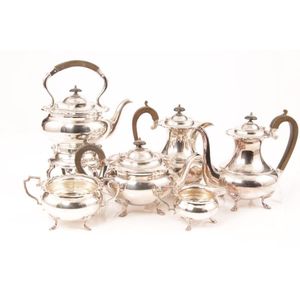George III Sterling Silver Sugar Bowl & Cream Jug
You must be a subscriber, and be logged in to view price and dealer details.
Subscribe Now to view actual auction price for this item
When you subscribe, you have the option of setting the currency in which to display prices to $Au, $US, $NZ or Stg.
- George Iii - George III (1738 - 1820) was King of Great Britain and Ireland from 1760 to 1820.
- Sterling Silver - Sterling silver is a mixture of 92.5% pure silver and 7.5% of another metal, usually copper. Fine silver is 99.9% pure silver, and is relatively soft and the addition of the very small amount of copper gives the metal enough strength and hardness to be worked into jewellery, decorative and household objects.
- Cartouche - An ornamental panel in the form of of a shield, oval or rectangular scroll with curling edges. It may be carved into the back of a chair or the top of a sideboard, or present on a piece of silver or jewellery, and contain the initials of the original owner, heraldic symbols, or some other inscription, such as the details of a presentation.
In ceramics the term defines the central area of a vase or similar with a decorative border in one of the shapes above, into which a decorative scene or figures have been painted. - Hallmarks - A mark stamped on articles of precious metals in Britain, since the 14th century, certifying their purity. It derives its name from the Guild Hall of the Goldsmiths' Company, who recieved its Charter in 1327 giving it the power to assay (test the purity) and mark articles of gold and silver.
The hallmark will consist of several marks, including the:
- silver standard mark, indicating the purity of the metal. Sterling silver is .925 pure silver.
- the city mark indicating the city in which it was assayed eg London, Birmingham, York etc.
- the date mark, usually a letter of the alphabet in a particular font and case,
- a duty mark, indicating whether duty had been paid to the crown, and only in use from 1784 to 1890
The piece may include an additional mark, the maker's mark, although not forming part of the hallmark, will be located in the vicinity of the hallmarks.
Sometimes silver plated items will bear faux hallmarks, often confusing those not familiar with silver markings. - Acanthus - A stylized leaf motif, one of the primary decorative elements of classical Greek and Roman architecture, derived from the genus of flowering plants in the family Acanthaceae, native to tropical and subtropical regions of the Mediterranean area. It is a common element in classical Greek and Roman design, and is often seen in Corinthian and Composite order columns and used as a decorative element in English, European and Australian furniture, particularly on the curve of a leg, and as decoration for a corbel.
This item has been included into following indexes:
Visually similar items

George V sterling silver three piece teaset stemmed circular shape with egg and dart rims and bases, Sheffield, 1923

English hallmarked sterling silver George V tea set comprising a teapot, sugar bowl & cream jug, with gadroon edges, converging fluted hand-chasing, & timber handle & finial. Sheffield, 1934, maker Viner's Ltd. Weight including handle & finial 1210g

A Danish silver creamer and sugar basin, circa 1839 with maker's mark and Netherlands import mark indicating. 835 silver, each of squat lobed form with scroll and floral decorated rims and applied motifs to body, generous 'C' scroll handles and raised upon

A silver plate six piece tea service includes spirit tea kettle, tea pot, coffee pot, hot water jug, milk and creamer.
